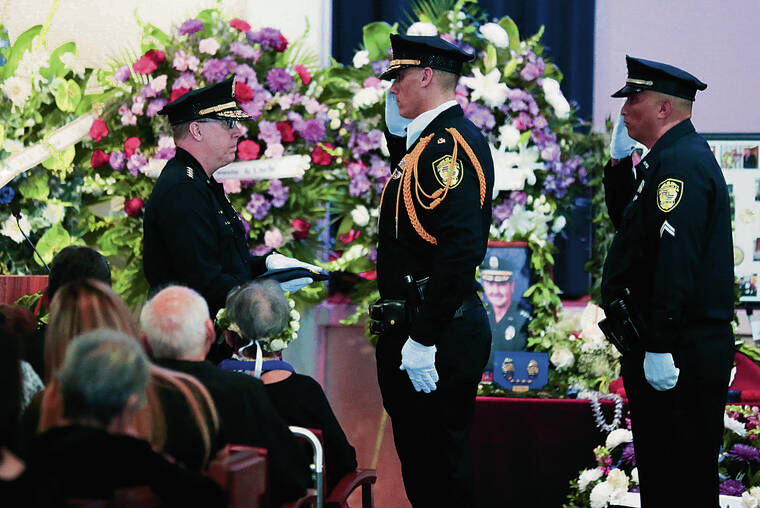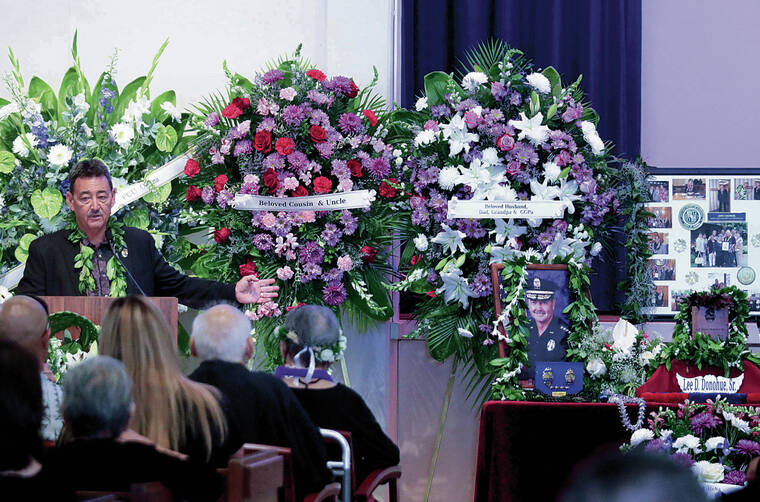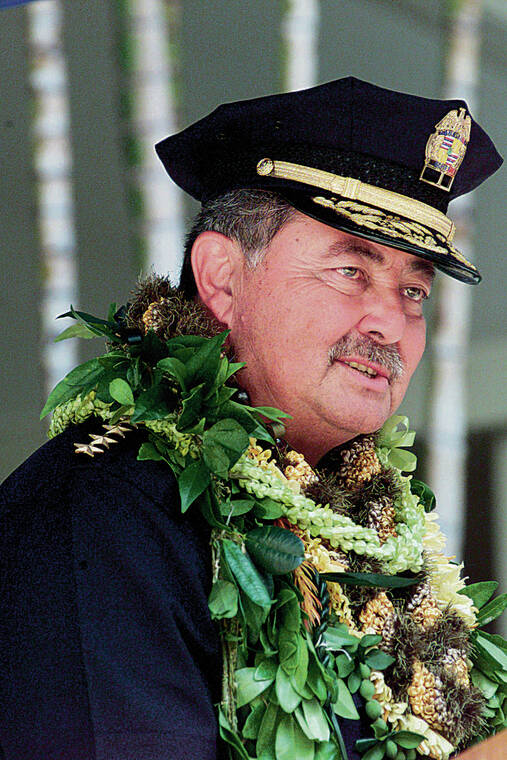Hundreds of the rank- and-file and top brass in blue paid their last respects to the late Honolulu police chief known as a “cop’s cop” Friday in a lump-in-the-throat, final “pass in review” as bagpipers played “Amazing Grace.”
Chief Lee Dixon Donohue, who retired in 2004, was eulogized for his six years as chief, his 40 years of service with the Honolulu Police Department, for being a dedicated husband and father, and for his continued work in community causes.
Donohue died July 9 at the age of 80 of pneumonia after battling long COVID-19.
“He was one of the most trusted, respected, revered and inspirational chiefs to lead the Honolulu Police Department into the modern era,” his hanai son, William “Billy” Oku Jr., said in his eulogy.
Donohue was given a rousing standing ovation by the many in attendance at a celebration of life, where HPD uniformed and civilian personnel, retirees, family, friends, along with top officials of law enforcement and government from across Hawaii, overflowed the two chapels at the Nuuanu Memorial Park and many watched remotely.
“Chief Donohue was a visionary leader who guided the department into the 21st century,” during one of its most transitional times, Oku said.
He led the department into gaining national accreditation, replaced its outdated radio system, expanded community policing and made automated external defibrillators standard equipment for police vehicles, he said.
An AED saved the chief’s life when at age 61 he collapsed after suffering a sudden cardiac arrest at the police training academy while he demonstrated martial arts to recruits.
Donohue started as a foot patrolman in 1964 and was promoted to sergeant in 1971, then lieutenant with the Narcotics/Vice Division in 1976, captain in 1980 and major in 1984. He rose to the executive level in 1993 as assistant chief, then deputy chief. He became HPD’s eighth police chief in 1998 and served until his retirement in 2004.
During 9/11, Donohue provided a calm, steady hand and worked with federal, state, county and military agencies, Oku said.
He is credited with improving hiring and retention efforts of officers during his tenure, following a mass exodus of officers who left for better-paying jobs in the Northwest.
Also, the popular three-day, 12-hour work schedule for patrol officers was implemented.
The Weed and Seed programs were established in downtown Honolulu, Kalihi and Waipahu.
But Donohue also had to deal with internal department scandals.
In 2001 the union police chair called for Donohue’s resignation after he didn’t relieve two high-ranking officers of their duties following a food scandal in which they were accused of spending money allocated for prisoner meals on food for police officers, including top brass.
In 2001 and 2002, civilian department employees purchased auto parts from a vendor at inflated prices for kickbacks.
In 2004 the supervising lieutenant and four officers from the Career Criminal Unit, part of a botched operation, were disciplined for not following department procedure in a shooting that led to the death of Officer Glen Gaspar in March 2003.
Outside of HPD, Oku shared how Donohue co-founded KickStart Karate, a program to teach martial arts and life skills to at-risk youth, and founded the Honolulu Police Community Foundation, which promotes positive interactions with police and the community as well as raises funds to help students, seniors and HPD.
Donohue served on 13 boards, including the Visitor Aloha Society of Hawaii and the Honolulu CrimeStoppers program.
He started his own security services company, Magnum Security & Investigations.
Lee Donohue Jr. described his father’s humble beginnings. After his parents divorced when he was 6, he was raised by his single, immigrant mom from Korea.
She sent him to live with his oldest sister, Grace, in Los Angeles, and her husband, who helped instill honor and humility in the boy, which helped him get into Saint Louis School.
But he got kicked out. Donohue Jr. said that turned out to be a good thing since he enrolled at McKinley High School, where he met his high school sweetheart, Lucille.
Donohue would tickle Lucy’s feet during Sunday services.
“My dad loved jokes,” said Donohue Jr., who peppered his own stories of his father with lots of humor.
While he was chief, he forwarded a joke in an email to someone in the department, and someone turned him in.
But going back to his humble beginnings, he said that his family lived above Oahu Plumbing while his father was a plumber’s apprentice.
While digging a ditch near Punahou School, a Punahou boy looked down at him.
That’s when he thought, “I need to do something else,” Donohue Jr. said.
Donohue told the Honolulu Star-Bulletin shortly after retiring that he had wanted to be a police officer since he was 10 years old, and that it might be in his DNA since his father tried to become a police officer but failed the physical.
Donohue Jr. said his father contracted sepsis in 2001, fought it and beat it. In 2002 he was diagnosed with stage 4 cancer, “kicked cancer’s ass,” with radiation and chemotherapy, and went into remission.
The younger Donohue said his father would have said, “It was my honor to serve you. I hope I did a good job.”
Friend Robert “Bobby” Cravalho, who served under Donohue and spoke at his service on behalf of the family, said afterward, “He treated everybody fairly, and you would always know what the chief was going to do because he was going to do what was right.”
“He would always say, ‘Be nice.’”
“Can you be nice when you issue a citation? Can you be nice when you arrest someone? Yes, you can.”








